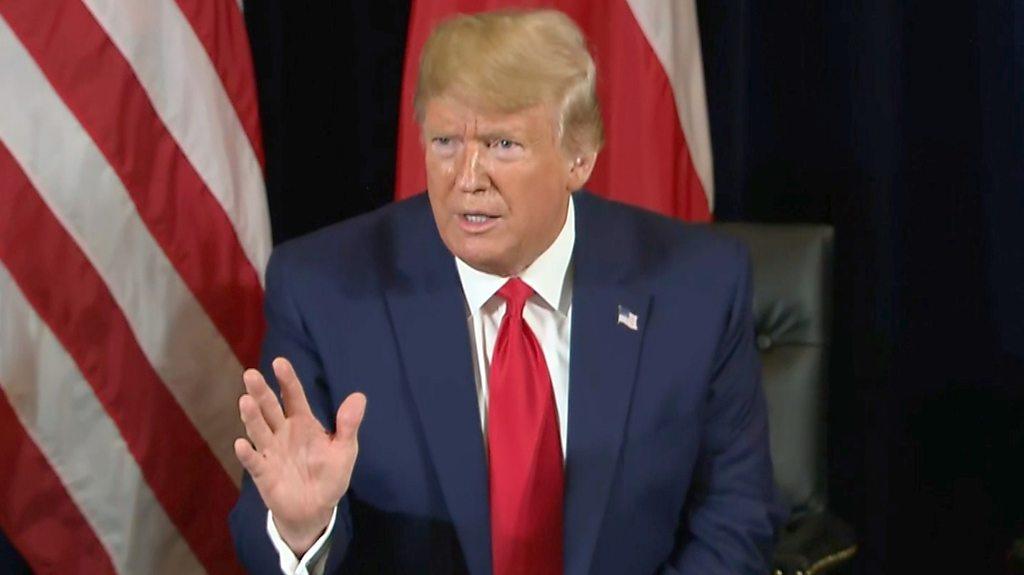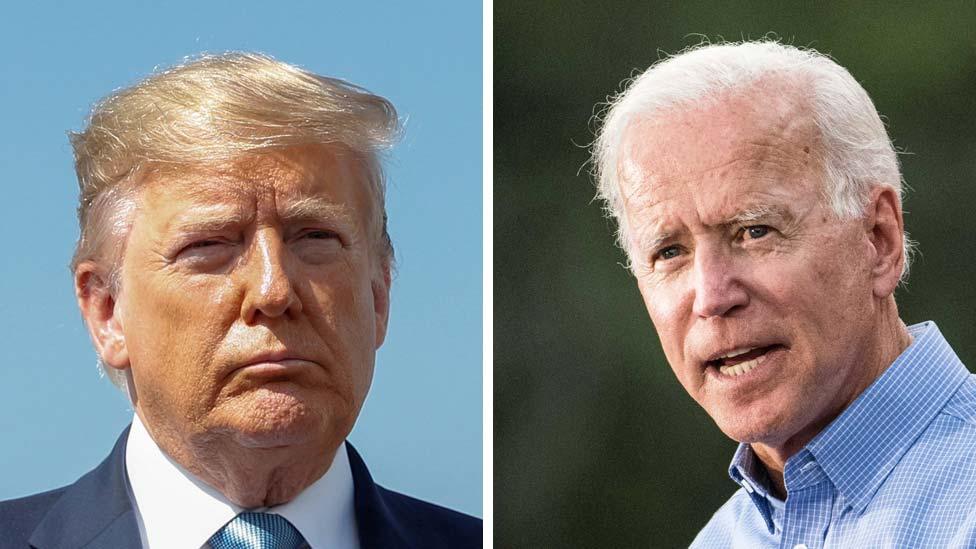Trump impeachment: Why Pelosi made her move - and what happens next?
- Published
Pelosi: "The president must be held accountable; no one is above the law."
Nancy Pelosi has opened a formal impeachment inquiry into President Trump - why now, and what could happen next?
For months, Democratic leaders in the House of Representatives have been playing a semantics game. They wanted those who supported and those who opposed a formal impeachment inquiry into President Donald Trump to both think they were getting what they wanted.
This strategy suggested a fear by Speaker Pelosi and others that heading down the path to impeachment would put moderate Democrats facing tough 2020 re-election fights at risk and jeopardise the party's House majority.
That calculus appears to have changed, after the rapid drumbeat of new revelations about Mr Trump's contacts with Ukrainian President Volodymyr Zelensky. Now even middle-of-the road politicians are coming out in favour of an impeachment proceeding.
Congressman Max Rose of Trump-friendly Staten Island, New York, had been a prominent holdout - but even he has softened his stance.
"This is a serious crisis, all options must be on the table, and it's time Republicans are as interested in the truth as the American people," he said in a statement., external
The dam has broken. The genie is out of the bottle. Pick your metaphor. The simple fact is that Ms Pelosi - a keen judge of the political mood within her caucus - has made the decision to shift from resisting impeachment to advocating for it.
So what changed? The prospect of impeachment has been knocked around since the early days of the Trump presidency. Over the course of the Robert Mueller inquiry into Russian meddling in the 2016 presidential election, each new revelation and indictment were met with calls for Congress to act.
Allegations about presidential obstruction of justice and Trump campaign collusion with Russia, as well as a grab bag of others - from unconstitutional profiteering from government largess to campaign finance violations - all prompted various level of howling for the president's removal.
It took the Ukraine story, however - the possibility that Mr Trump used presidential powers to pressure a foreign government to dig up (or manufacture) damaging information on a political rival - to forge the will among Democrats to contemplate a clear and unambiguous move toward impeachment.
There are a number of possible reasons why.
It could be that the latest controversy has hit like a clap of thunder over the course of just one week, rather than the drips and drabs from the Mueller investigation. The prospect of a quid-pro-quo involving the powers of the presidency and a political rival is also an easier story to explain than Emoluments Clause violations or byzantine campaign finance infractions.
Joe Biden - Trump must stop stonewalling over whistleblower or face impeachment
Then there's the fact the Mueller inquiry was backward-looking - dealing with alleged misdeeds from the 2016 election. Many of the Democrats currently mulling impeachment weren't in Congress back then and campaigned on other issues in the 2018 mid-term elections.
The Ukraine story, on the other hand, is about allegations of an ongoing attempt to use the presidential powers for personal political benefit - events that have occurred on their watch, as it were. It's about requesting a foreign government to give information that could help the president win a future election - not about what a foreign government had done to influence a past one.
Accusations of sour grapes, or of relitigating past campaigns, don't apply here.
This controversy also once again highlights the blurred lines between the personal and the official that has frequently typified the Trump White House.
Rudy Giuliani, Mr Trump's personal lawyer, was the president's point person in pressuring Ukraine to launch an investigation into Joe Biden and his son Hunter. Although the former New York City mayor said he was in contact with the State Department prior to his August trip to Spain to meet with a Ukrainian official for this purpose, it wouldn't be surprising if the Ukrainians were confused about whether this was a formal request from the US government or a more unofficial effort.
What does it take to impeach a president?
The path forward is uncertain. The president has already announced that he will release the transcript of his 25 July phone conversation with Zelensky. While that won't be enough for Democrats, perhaps the White House will do more to accede to Congress's requests, thereby dousing the hottest of the impeachment fires.
Opinion surveys could show the latest drama is taking a toll on one party or the other, causing political will to crumble. A YouGov poll said 55% of Americans would support impeachment, external if it was confirmed that President Trump suspended military aid to Ukraine in order to push the country's officials to investigate Mr Biden.
Or both sides could dig in for a long, gruelling battle that could drag into the darkest days of winter, as an embattled president gears up for a re-election fight that could be conducted in the shadow of a constitutional crisis.
- Published23 September 2019

- Published23 September 2019

- Published9 September 2019
